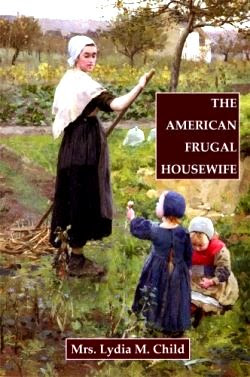 ”It is wise to keep an exact account of all you expend – even of a paper of pins.” The American Frugal Housewife. 1838. Written by Mrs. Child and dedicated to those who are not ashamed of economy.
”It is wise to keep an exact account of all you expend – even of a paper of pins.” The American Frugal Housewife. 1838. Written by Mrs. Child and dedicated to those who are not ashamed of economy.
This is excellent, timeless advice. I have been keeping a “price list” for the last 10 years or so – I keep it on a computer spread sheet, but pencil and paper work well too. I keep a list of the things I regularly buy, along with the last price I paid for the amount I bought. I let the spread sheet calculate the cost per pound or package so I can compare apples to oranges.
I usually price recipes too, and am surprised at the difference even 5 years has made to the price of staples, like homemade bread or pie crust.
I use my price list to peruse the grocery ads for the stores near us – they come weekly in our “shopper” flier, but are also on-line, even for our small town. I can also tell if a larger quantity is a good buy at stores like Sam's, Costco or our nearby Amish stores or not.
I often jot my last best price on my shopping list so I can compare.
I often jot my last best price on my shopping list so I can compare.
My brother-in-law, Don, said the other day that he expected they could live for a year on their stored food supply from their homestead – I think we might manage at least 6 months, especially with a garden – although variety would suffer.
Keep track of the months items you use a lot are on sale. There is often a pattern, and after awhile, you can see how much you need to buy to go until the next sale.
Keep track of the months items you use a lot are on sale. There is often a pattern, and after awhile, you can see how much you need to buy to go until the next sale.
There are, however, a few things besides fresh produce that I don’t purchase in quantity – I simply can’t use fats and oils fast enough to keep larger “Costco” or “Sams” packages from getting rancid, for example, although I buy and freeze cheese, butter and lard. I never buy things we don’t both like – unless it’s chocolate, of course.
We actually spent $500 less last year than the year before for food for the year – we had a larger garden area and I also canned more. Our goal last year was to waste as little food as possible, employing the "use it up" theory, and I believe we must have had some success. You can see that we don’t live on just beans or dog food – we enjoy a variety of in-season foods.
It's never to late to get out your grocery receipts and start keeping track of prices and weekly expenditures. Unless you shop daily, this isn't hard if you just do it regularly - I don't think it takes me more than 20 minutes a week.
You may also want to start keeping track of what you throw away - what can you do to eliminate that waste?
Treat your household as a "business" - and become a better steward.
You may also want to start keeping track of what you throw away - what can you do to eliminate that waste?
Treat your household as a "business" - and become a better steward.
















I didn't do such a detailed list until my husband passed away in 2006. Now I am very careful to keep a record of every penny I spend. I wish I would have started this long ago. Excellent post.
ReplyDeleteA $500 annual savings is significant- congratulations!!!
ReplyDeleteHow big a garden do you have? What vegetables did you can/freeze? Last year we expanded our garden somewhat, but we only grew tomatoes, broccoli, green beans and hot peppers. The hot peppers were a bust, but we got a reasonable yield on everything else.
I'd like to try carrots, but I think they might be hard for us to grow in our clay-base soil.
Jeffery, Two years ago I raised carrots in a large outdoor planter. I bought the seed at Earl May's Garden Center. They are made for container gardening. They grew well, and had a good flavor.
ReplyDeleteWe don't have a big garden - only containers, but intensively planted - we also canned from my brother-in-law's garden and fruit trees and also fruit we were given. We never turn down any surplus that gardeners are giving away. When I have had bigger gardens, I used raised beds with plenty of compost - lots of harvest from less ground. I like to pick and eat, not weed! I also try to plant things that are expensive to buy when I have limited space.
ReplyDeleteI think using everything you buy; reducing waste, and bulk buying and portion control all help. We improved our pantry and freezer space this year to take better advantage of good prices when we found them and to hold more home canned goods, like canned beef and poultry, also purchased on sale.
Lots of useful infrmation here, Sue and Myrna; thank you!
ReplyDeleteI had't considered using spreadsheet techology as a budgeting tool; will investigate this further.